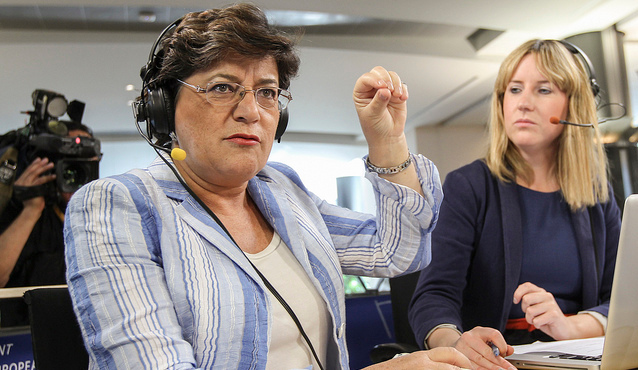by Eldar Mamedov
While the Trump administration is escalating tensions with Iran and moving closer to the Persian Gulf monarchies, the European Parliament (EP) took a step in the opposite direction. At its plenary session on February 16, it adopted a resolution condemning human rights violations in Bahrain and Kuwait, with a particular focus on Bahrain. Since this nation is a West´s key ally in the Persian Gulf region and an adversary of Iran, such a step by the EP shows that, to its credit, it doesn’t use human rights as a geopolitical weapon against the regimes it does not happen to like.
The immediate trigger for the resolution were executions carried out by Bahraini authorities on January 17 against three individuals alleged to have killed police officers in 2014: Sami Mushaima, Abbas al-Samea, and Ali al-Singace.
Although non-binding, the EP resolutions in foreign relations are taken seriously by the countries concerned for they have a potential to impact relations with the EU, one way or another. Nothing illustrates this fact better than aggressive efforts by the Bahraini government to derail the vote.
Bahrain based its defense on two main arguments.
First, since the death penalty is not prohibited under international law, it accused the EU and the European Parliament of “imposing their views” on countries with different cultural and legal traditions. But even though the EU does oppose the death penalty in principle, this was not the main point of the resolution. Rather, as pointed out by respectable international human rights organizations such as Human Rights Watch and Reprieve, the executions in Bahrain were carried out in clear contravention of binding international law, namely, the UN Safeguards Guaranteeing Protection of the Rights of Those Facing the Death Penalty.
In particular, safeguard 4 requires that capital punishment only be imposed “when the guilt of the person charged is based upon clear and convincing evidence leaving no room for an alternative explanation of the facts.” However, as Reprieve notes, no convincing evidence linking the defendants to the crime exists. Their convictions were based almost solely on confessions extracted through torture.
Furthermore, safeguard 5 requires that capital punishment only be carried out following all the fair trial rights contained in Article 14 of the UN International Covenant on Civil and Political Rights (ICCPR). The UN Human Rights Office has ruled that the trial of the executed men breached these rights. They received no meaningful torture investigation. They were never allowed to meet with a lawyer at any point from their arrest to their execution. Their lawyers were never allowed to cross-examine prosecution witnesses and were not given full copies of prosecution evidence.
Finally, safeguard 7 requires that anyone sentenced to death has the right to seek a pardon. Mushaima, al-Samea, and al-Singace were executed less than one week after their death sentences were finalized. According to both Reprieve and the UN Human Rights Office, they were granted no avenue through which to apply for pardon.
All of these violations represent clear breaches of ICCPR Article 14 and of international law. Based on this evidence, European MPs validated the view of the human rights organizations that these executions were unlawful and summary.
The second line of defense deployed by the Bahraini government was that harsh security measures, including the resumption of the application of the death penalty, were needed to counter the Iranian efforts to destabilize the country. For supposed evidence of such malign interference, Bahraini representatives referred to an article by Matthew Levitt and Michael Knights of the Washington Institute for Near East Policy on “Iranian-backed terrorism in Bahrain.” The many inconsistencies and flaws of this article were exposed on Lobelog by Emile Nakhleh. The authors focus on “periodic threats from Iran and Lebanese Hezbollah which are often used in response to actions such as Saudi Arabia’s January 2016 execution of Shiite cleric Nimr al-Nimr, or Bahrain’s major crackdown on Shiites last summer,” but they fail to adequately analyze how such actions fuel Shiite discontent to a much greater degree than any Iranian meddling would.
The argument of Iranian interference failed to sway the majority of European MPs. In fact, Ana Gomes, a Portuguese Socialist and one of the key co-sponsors of the resolution, made it clear in her speech that a sustainable solution to the Bahraini crisis lies not in intensifying the crackdown on dissent but in engagement with the different segments of the Bahraini society, including, in particular, its Shiite majority, on the basis of dignity, respect, and equal rights. Consistent with these calls was the adoption of an amendment to the resolution that denounced the sales of Western arms and technology to Bahrain that enable the regime’s domestic repression. The EU Trade Commissioner Cecilia Malmstrom, who represented the EU executive branch at the plenary debate, joined MPs in their condemnations of the executions in Bahrain, while making no reference to Iran’s role at all.
The EP resolution—the fourth focusing on human rights violations in Bahrain since 2015—is a clear political signal that the Bahraini government’s claims that the executions and other forms of crackdown on dissent are legitimate security measures against alleged Iranian interference lack international credibility. For a nation like Bahrain, whose security depends on an enduring alliance with the West, ignoring international concerns about its human rights practices is a reckless path to take.
This article reflects the personal views of the author and not necessarily the opinions of the European Parliament. Photo of Ana Gomes by Connect Euranet via Flickr.





